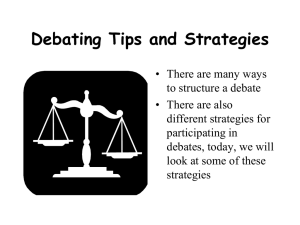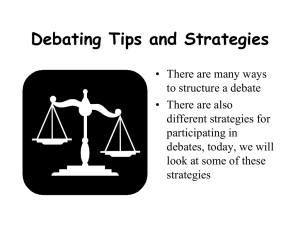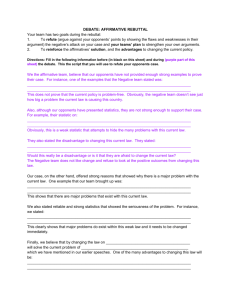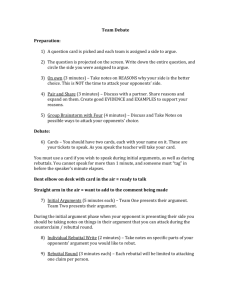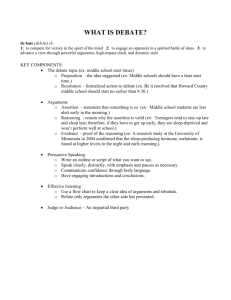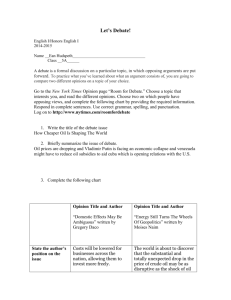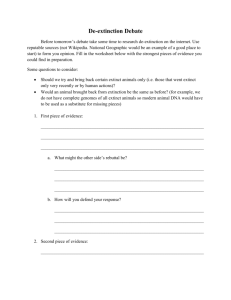Debating Tips and Strategies
advertisement
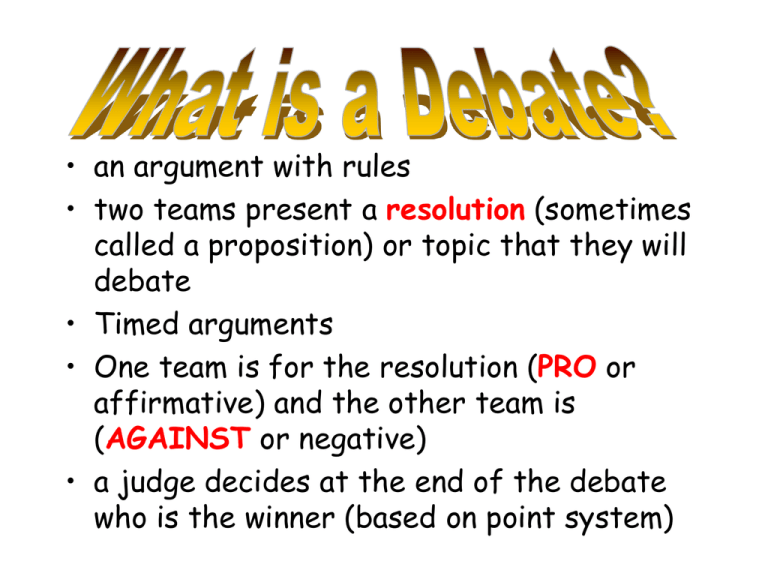
• an argument with rules • two teams present a resolution (sometimes called a proposition) or topic that they will debate • Timed arguments • One team is for the resolution (PRO or affirmative) and the other team is (AGAINST or negative) • a judge decides at the end of the debate who is the winner (based on point system) Order of Speaking • Very important • Cannot be changed • See handout The 3 major parts of a debate 1. CONSTRUCTIVE SPEECH 2. CROSS EXAMINATION 3. REBUTTAL 1. CONSTRUCTIVE SPEECH • • • • Begins with BIRT (Be it resolved that…) States 3 or 4 supporting points first Then elaborates on each one Plan your strategy (for e.g., go from strongest to weakest) • Recap at the end 2. CROSS-EXAMINATION • Most difficult part • Thinking on your feet • Question the validity of your opponents' constructive speech by source, date, relevance • Show their weakest points • Question them aggressively • Start with general questions then get really specific • Undermine the evidence 3. REBUTTAL • Designed to argue the case made • It's your time to point out the inconsistences, absurdities, and illogical argurments of your opponents. • Provides the opportunity for speakers to critique their opponents' arguments • Absolutely no new evidence may be presented during this time • It's time to do some final damage here •The first speaker in a debate must make sure that the resolution is clearly stated and defined. What is the Resolution? • The topic of the debate • The point on which both parties have agreed to debate • Always stated in the positive • Begins with the phrase (BIRT): Be it resolved that … Some examples: • Be it resolved that Canada is a better place to live than the U.S.A. NOT • Be it resolved that Canada is not a better place to live than the U.S.A. And … • Be it resolved that all public schools in Canada should make uniforms mandatory for all students. NOT • Be it resolved that all public schools should not make uniforms mandatory for all students. Debating Tips and Strategies • There are many ways to structure a debate • In this class, you will follow the handouts carefully and the time allotments will not •DON’T side track your opponents with irrelevant points, stay on topic. •DON’T attack your opponents. •DO stick to your planned, researched arguments. TIPS • Cue cards can help a debater to stay focused, but DON’T read from them, use them as a guide. • Speak to the audience or moderator, not the teacher. •DO thoroughly research your topic and position, the best start to squashing a rebuttal is a well researched, well designed presentation. •DON’T simply state facts: •This is the path to being a dull speaker •Not stating sources or not backing up statements can lead to heavy rebuttal from your opponents •DO use humor and / or anecdotes in your speaking: •Using examples helps illustrate your position, and uses an argument of precedence •Make sure your information is appropriate IMPORTANT TIME IS A VERY IMPORTANT FACTOR IN A DEBATE………………. •DO be aware of time constraints, if there are any. •Practice your initial speech so you will be “on top” of the situation. •Know what it feels like to speak for the allotted length of time, speaking too much or not enough weakens your position. •DON’T try to “juggle” too many points at once. State your ideas in a logical order. •TIP: the more you practice and plan your speaking, the less nervous you will be. •DON’T use inappropriate language or gestures: •People will ignore your information if not presented in an appropriate manner. Any argument that you do not address in a rebuttal will be left in the memory of others as your opponents stated it. Likewise, any rebuttal from your opponents that you do not address will also be left in the minds of your audience / judges. •DO be aware of what your partner(s) plans are. •DON’T work alone and risk being redundant, make the most of your team’s time. •DO recycle information in your closing speech. •Remember:The closing speaker(s) should sum up all relevant arguments and rebuttals without introducing any new information. Follow these tips and suggestions, and everything will come together for a successful debate!!!
